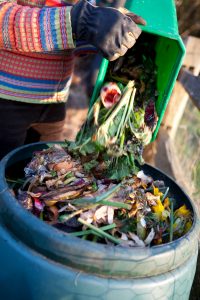What helps the environment, saves money and feeds the soil at the same time?
 Did you know that each year, Australian households generate around 13 million tonnes of organic waste and that about half of that ends up in landfill?
Did you know that each year, Australian households generate around 13 million tonnes of organic waste and that about half of that ends up in landfill?
May 7 to 13 marks International Compost Awareness Week in Australia. This is a week during which Australians are invited to pay closer attention to what they put in their rubbish bin and consider that often about half of that could be put to better use.
Compost is not only a valuable organic resource (plants love it and it helps to build healthy soils) but also it reduces the volume of material going to landfill, the associated detrimental environmental effects and makes economic sense too.
Diverting organic materials from landfill and properly composing them can help in the effort to mitigate the effects of climate change by reducing methane emissions and contributing to soil carbon storage.
Organic materials such as food scraps and garden waste breakdown to methane when decomposing without air in landfill conditions. Methane, a greenhouse gas, is 25 times more potent than carbon dioxide so reducing its emissions is an important factor in combating climate change.
Using compost as a fertiliser or soil conditioner returns carbon into the soil, where it can be locked up or utilised for plant growth, rather than being emitted into the atmosphere.
Landfill is the most expensive form of waste management and while it’s free to drop your rubbish off at the Mid-Western Regional Council waste stations, don’t be fooled – as ratepayers we fund the operation and maintenance of these facilities.
The existing landfill cell at the Mudgee Waste Depot will reach capacity within 10 years. As space runs out and alternatives need to be sought, costs are likely to increase. So reducing the amount of organic waste going in will prolong the life of the existing landfill site and reduce the costs long term.
Composting reuses food waste and nutrients are recycled into fertiliser. By applying compost to gardens, farms and other land uses, nutrients are returned to the soil to feed diverse soil life. The bacteria, fungi, insects and worms in compost support healthy plant growth, rather than letting organic waste rot away in landfills.
So start a compost heap (or worm farm or get a few chooks to take care of the scraps), reduce waste and your carbon footprint. Happy composting!
